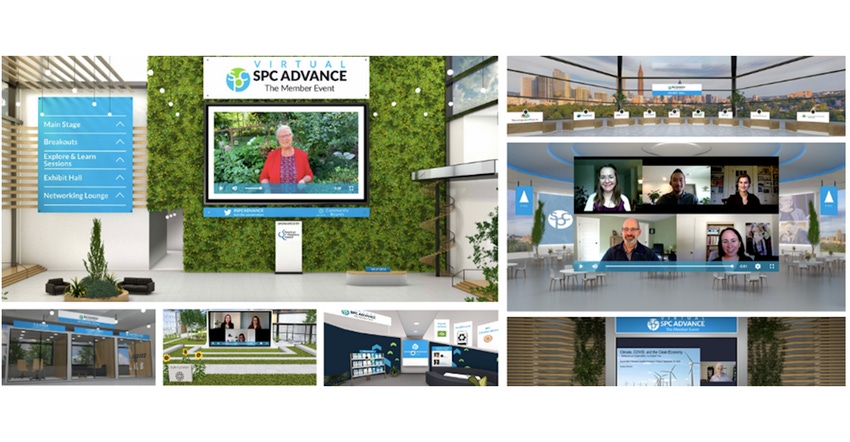10 Sustainable Packaging Insights Emerge From 2020
After a full program of sustainability sessions during the recent Virtual SPC Advance event, it’s easy to identify the top sustainability issues confronting packaging professionals this year.

Sustainable Resilience in a Time of Change, the theme of the 2020 Virtual SPC Advance, was delivered through more than 30 excellent presentations, panels, tours, roundtable discussions, and networking events given by leading industry experts within the sustainable packaging world and beyond.
Here are 10 key takeaways from the two-day members-only event held on September 29-30 by the Sustainable Packaging Coalition.
1. Prepare for the exponential.
The problems of climate change, species loss, resource extraction, and ocean plastics have grown at an exponential rate. The good news is that solutions can accelerate exponentially, too. For example, the cost to build new renewable energy has gone down 89% since 2009.
From a packaging perspective, that might also mean exponential growth in the availability of recycled content or a huge uptick in reusable packaging platforms.
2. Understand and respect planetary boundaries.
What planetary boundaries are we overstepping with today’s packaging systems? Because packaging requires sourcing materials, then manufacturing, distributing, and disposing of them, packaging typically plays a role in accelerating climate change. Respecting the limits of Earth’s natural systems will require addressing impacts along the entire life cycle of packaging, striving for a more closed loop, circular economy.
3. Focus, always, on people.
In his opening keynote address, Andrew Winston summarized his reflections of the challenges today by stating, “It’s time to address the significant consumer demand for more sustainable options. People are increasingly frustrated with over-packaged ecommerce deliveries, disillusioned with the amount of single-use packaging in foodservice, and frustrated by materials that aren’t recyclable or compostable.”
4. If you don’t hear about it, you don’t know about it.
In Suzanne Shelton’s TED-Style talk, she asked companies, “What do you stand for?,” dispelling the myth that business and politics do not mix. She continued to highlight the critical call to action to share information and be transparent in the sustainable efforts businesses and brands are making.
5. Nature-based carbon removal strategies (such as growing trees, restoring forests, and regenerating ecosystems), is projected to enhance the ability to sequester carbon in biomass and soils by supporting soil water quality and increasing biodiversity.
Regeneration, Transparency, and Resilience are three matters highlighting how industry needs a shift in mindset — from one of simply ‟doing no harm” to one of becoming regenerative, and actually ‟doing good.”
6. The future will be new things in new places — not new things in old places.
Focused on a vision, a design lab, and a FutureWorld, Space10 urges for new things in new places instead of new things in old places to tackle today’s sustainable challenges by thinking about the future as a direction rather than a final destination. For example, to preserve ecosystem services such as pollination, Space10 created free digital files that can be downloaded by anyone containing bee home templates that can be customized and printed at a local makerspace.
7. Big data means big opportunities for sustainability.
In her TED-Style Talk, Julie Kae, the executive director of Qlik.org and Qlik’s global head of corporate responsibility, spoke to the power of data and technology and the role and responsibility that technology has in transforming business and advancing the sustainability agenda.
8. Recycled fiber is a good solution for the general industry, but for a specialty industry in particular, where they make many food packaging and processing papers, recycled fibers need additional processing to achieve the direct food contact certification and maintain food safety.
Addie Teeters and Zach Leimkuehler, of Ahlstrom-Munksjö, led a Papermaking 101 tour, shining a light on how advancements in the papermaking process are moving into the sustainable food packaging space.
9. We can mitigate marine plastic pollution, and we can do it fairly soon.
Current measures being pursued can work if industries, governments, and consumers take the right measures. If these groups can dramatically amp up the intensity of these efforts, an 80% reduction in marine plastic pollution can be achieved by 2040. The question is not what to do, it’s how much to do, and the answer, of course, is MUCH MORE.
10. Wash steps are an expensive but critical step in producing high-quality PCR films.
Revolution gave a great presentation showing how even before, in pre-COVID-19 times, its films undergo extensive washing steps to remove contamination that would otherwise create processing difficulties and result in unusable film containing holes and other defects. While the wash process is expensive, it allows Revolution to produce high-quality, thinner gauge films with up to 97% post-consumer recycled (PCR) content.
Overall, Virtual SPC Advance did not shy away from the sticky challenges facing the sustainability industry in today’s world. Instead, the speakers, presenters, and SPC members embraced the event’s theme by spreading their industry knowledge in an attempt for their listeners to conquer these challenges. While still unknown, next year’s SPC Advance theme is sure to bring even brighter thinking and innovations to move the needle where we all want to see it go.
About the Author(s)
You May Also Like




